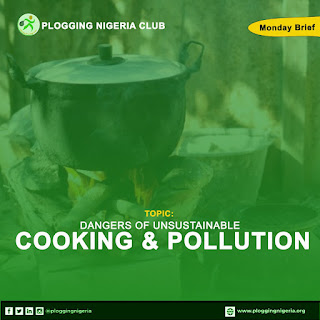As potentially harmful as solid fuels can be, they are still much in use today. Undoubtedly, there are reasons why a larger part of the population uses traditional biomass in cooking, as discussed in our previous article. However, the harmful effects of unsustainable cooking practices on human health are something to consider.
This is not just about the environment. It's about Humans.
Did you know? The World Health Organization (WHO) estimates that about 3.8 million death each year results from the domestic use of these solid fuels. Let's come to our country. In Nigeria, the number of annual deaths resulting from Kitchen smoke is over 90,000. This high number of deaths puts kitchen smoke in the same group as Malaria and HIV/AIDS, as the top three killers in Nigeria
But there's no smoke without a fire right? Here is the background story of how kitchen smoke occurs.
In the process of cooking, solid fuels such as charcoal and wood are burned which leads to the release of CO and other harmful particles into the atmosphere leading to household air pollution. But, the atmosphere is not the only thing affected. End users, i.e those using the fuels, inhale the particles which cause eye pain, chest pain and other health risks.
With consistent exposure to kitchen smoke, these particles flow into the lungs causing increased difficulty in breathing, which could increase the occurrence of lung and heart-related conditions. Also, Asthmatic conditions may be triggered in such occurrences. For instance, WHO affirms that 17% of deaths from lung cancer are due to exposure to particles and substances from household pollution.
Household air pollution is killing people regardless of age and gender. All it takes is exposure. In this sense, can you see how our women and young girls, who are mostly saddled with the responsibility to cook for the family, are at risk? Women and girls, performing domestic tasks, are not only worn out using firewood, but they also face increased health risks due to consistent exposure to kitchen smoke.
This is to tell you that the issue of unsustainable cooking practices is not just "another climate talk". Lives are at stake.
"The climate crisis is a health crisis: the same unsustainable choices that are killing our planet are killing people.
— Dr Tedros Adhanom Ghebreyesus (Director–General, WHO)
Household air pollution is more than an environmental problem. But, one thing you should know is that; if it affects the environment, it's going to affect us. It already is, as you can see in the number of deaths recorded. Without a doubt, clean cooking would save lives as it is more sustainable, eco-friendly and carbon-free and should be encouraged. At this point, you should understand why we need to press for cleaner ways of cooking.
"So, does this mean I should not cook anymore?"
"Wood and Coal are more accessible, why do I have to go the extra mile to practice clean cooking?"
— Clean cooking Skeptics (probably)
Ultimately, the question is not whether clean and sustainable cooking is easy to achieve. The real question we have to ask ourselves is whether our health is important. "Is our health reason enough to fight for cleaner cooking energy?"
I believe it is. You deserve to breathe clean, carbon-free air. But part of the responsibility is yours to bear.
Hopefully, it won't take too long (or two lungs😐) for us to realise this.
— Adeyemi Joy Ifeoluwa















0 Comments